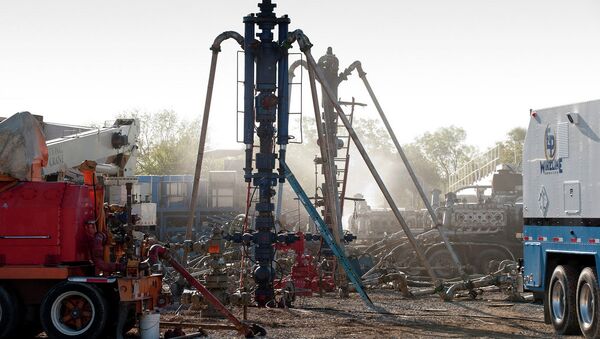MOSCOW, November 20 (Sputnik) — Germany’s draft law on fracking, seen by Reuters, is set to allow the controversial practice to take place despite environmental concerns.
“The draft makes clear that in exceptional cases commercial fracking could be allowed after successful test drilling and the approval of a special committee,” Reuters writes.
The move represents an easing of the stricter position adopted in the summer, when a draft guideline declared they would uphold a complete ban on fracking until 2021, excluding test drilling for scientific purposes. According to Reuters, Environment Minister Barbara Hendricks told the Ruhr Nachrichten newspaper in June, “I think fracking is not only a wrong but also an overrated solution to the energy question," adding, "Drinking water and health are the absolute priority."
Fracking, also known as hydraulic fracturing, is the controversial process of extracting shale gas from the ground, using high pressure liquid and volatile and toxic chemicals. It has been banned in France on environmental grounds, and is carried out in Britain under strict environmental safety guidelines. Environmental experts warn that fracking presents ecological risks including contaminated ground water, earthquakes and air pollution.
The shift in opinion on fracking follows pressure on the German government to find alternative energy sources. Reuters reports that the decision to allow fracking represents the government “bowing to pressure from industry,” amid concerns about its competitiveness. Fracking enthusiasm in the US has helped to push down energy prices, and political pressure to cool ties with Russia over the crisis in Ukraine has led to a search for other forms of energy. Russia currently supplies Germany with a quarter of its entire energy needs.
On Monday, Germany’s Environment Minister Barbara Hendricks told Deutschlandfunk that the government was not going to relax its ban, as had been reported in Der Spiegel. “The ban is still valid: fracking is prohibited for a depth less than 3,000 metres,” Euractiv.com reports her saying. However, Hendricks added, “The state of science and research is not static; it is constantly evolving. That is why it would be completely wrong to set in stone such a ban on commercial fracking. That is neither how the state of science nor technology work in a democracy.”
In November 2013 coalition negotiators from the Christian Democrats and Social Democrats agreed to uphold a moratorium on fracking, which had been in place since plans drawn up by the previous coalition to regulate exploration were met with opposition due to safety concerns.


